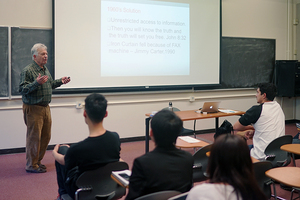Helping finance grads hit the ground running

Recent college graduates pursuing careers in business management and economics face steep competition, and many companies are encouraging universities to make classes more relevant to the real world. UC Santa Cruz is heeding the call.
With a focus on helping students earn a signature finance industry credential, UC Santa Cruz’s Center for Analytical Finance (CAFIN), together with the Economics Department, have launched a Chartered Financial Analyst (CFA) career track within its Business Management Economics program.
The U.S. financial sector is changing rapidly as it adapts to new technology and seeks a more diverse workforce, says Nirvikar Singh, distinguished professor of economics and Director of CAFIN.
The CFA track provides opportunities to prepare for this environment, he says, “by interacting with and learning from financial sector practitioners, and moving toward valuable professional qualifications for finance.”
The CFA exam is a rigorous three-part test that many professionals take over multiple years. If you pass it, you earn the CFA charter. CAFIN lecturer Kai Pommerenke describes the CFA as the “gold standard” in the investment world.
“If you can show a potential employer that you’re interested in the CFA program and ideally pass the level one exam,” he says, “that will give you a big leg up and make it much easier to find a job.”
In 2015, the CFA Institute, which administers the exams, approved the CAFIN CFA Program for participation in its University Recognition Program. UC Santa Cruz is one of only a few UCs in the program, which covers financial reporting and analysis, security analysis, portfolio management, corporate finance, economics, quantitative methods, and ethics and incorporates significant CFA exam material into the curriculum. As part of the University Recognition Program, the CFA Institute is providing UC Santa Cruz five scholarships to qualifying students to offset the high cost of the CFA exams.
For UC Santa Cruz, that curriculum includes an advanced course led by Pommerenke offering guidance on preparing for the CFA exams. Guest lecturers holding the charter provide perspectives what work in finance involves.
“I hope that students will get a better understanding of how finance is used and applied in the real world,” Pommerenke says.
For Jeffrey Sosa (Kresge ‘17) the course is one of his last before graduating.
“I’m learning a lot of things, especially about a career such as finance, investment banking, capital venturing,” Sosa says. “And I think this class helps you figure out: ‘All right, you’ve already got your major. What are you going to do with it?’”
Yesenia Lopez (College Ten ‘17) says the class introduced the possibility of a new career direction.
“I never thought about it. But now, looking at the presentations, I’ve given some thought to a job in the financial sector,” Lopez says.
Plantronics corporate finance director Jon Auman, a recent guest lecturer, says he is impressed with the practical focus of Pommerenke’s class.
“Giving students a view of the range of jobs available in the function is a great head start for them as they think about taking their first career steps,” Auman says.
The CAFIN CFA Program was launched with internal startup funds and is actively seeking additional funding to help expand the program with additional courses, practice CFA exams, and scholarships.